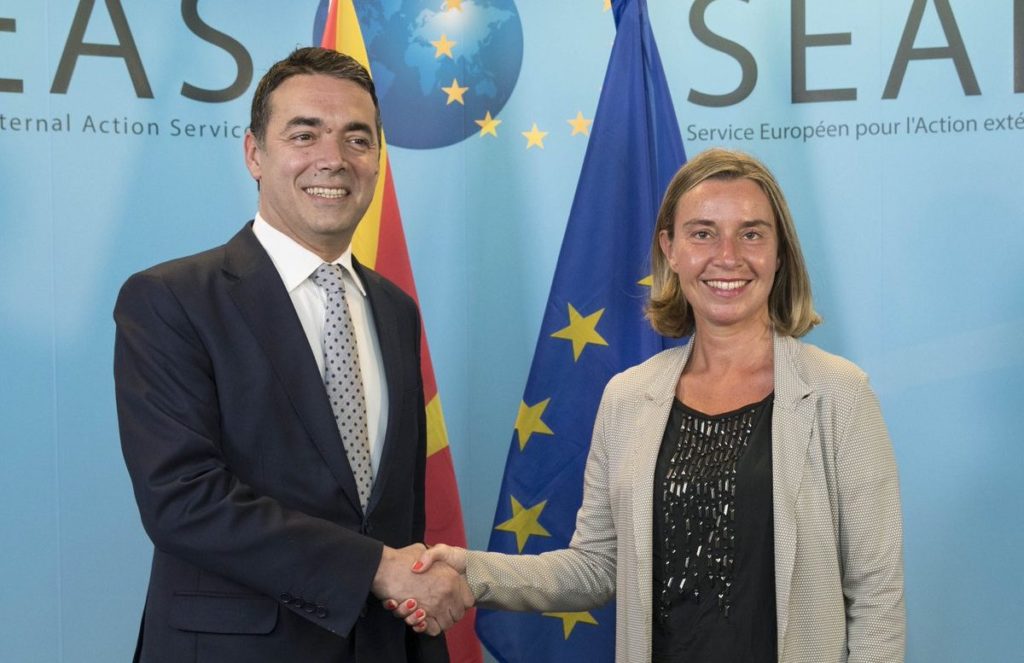Macedonia is the only candidate country that has been blocked from starting negotiations on EU membership because of a dispute with its neighbour Greece on its name. Macedonia is both the name of a sovereign country, the Republic of Macedonia, and a region in northern Greece. Until the issue is resolved, the country is internationally called the Former Yugoslav Republic of Macedonia. From time to time proposals on how Greece and Macedonia could agree on how to share the name, eventually by adding geographic or other identifiers, have been floated but without resulting in any agreement.
A solution was expected at the recent Western Balkans summit in Sofia but did not happen.
The name issue was also discussed with the Macedonian minister of foreign affairs, Nikola Dimitrov, at a policy briefing arranged by the European Policy Centre (EPC) yesterday (29 May) but he had to apologize for not being able to disclose any details in the on-going discussions.
“We are in the final state of negotiations. We have teams clearing the text right now and our Prime Ministers will soon discuss it,” he said and expressed both optimism and frustration that it has taken so long time to arrive at an agreement.
“We lost a generation because of the name issue. It’s not rational since it’s about different narratives, identities and emotions. The fact that the accession process was blocked meant also less leverage for EU to promote sustainable reforms in our country.”
Dimitrov blamed elites on both sides for having used the name issue for domestic purposes. “Now we have a second change to make it right and solve the issue. We don’t have the luxury of missing this opportunity.”
He mentioned confidence building measures by his country such as changing the name of the airport in Skopje from “Alexander the Great” to “Skopje International Airport”.
Any agreement will have to be adopted by the parliaments in Macedonia and Greece. “It won’t be easy but it’s possible. It’s a matter of political will,“ he replied to a question from The Brussels Times on the role of the parliaments.
His optimism is shared by EU foreign policy chief Federica Mogherini whom he met in Brussels.
“I was briefed both by him, but also by the Greek Foreign Minister, Nikos Kotzias, about the progress made in the name negotiations, which is indeed extremely encouraging and promising, but it is still not finalised,” she said at a press briefing on Monday.
The European Commission has warned that failure to act on its repeated recommendations to start negotiations with Macedonia calls into question the credibility of the enlargement process and puts at risk the sustainability of Macedonia’s reform efforts.
In its reports in the past, the Commission used to write that the Copenhagen political criteria continued to be sufficiently met by Macedonia. Dimitrov described the situation in the past in his country as an illiberal democracy.
“We learned the hard way why the political criteria matter, “he said. “Our institutions weren’t ready to handle them.”
Following a surveillance scandal in Macedonia, a new government took over last year after EU pressure. “We have made a U-turn since then,” Dimitrov said. For the first time, government and opposition have been able to agree on reforms. There has also been a change to the better in media freedom and in the way how public opinion works.
If the expectations would be dashed again, there seems to be no rational reason to delay the start of accession negotiations. Such negotiations could start under the internationally accepted name and the issue could be resolved at any time during the accession process or postponed until the very end of the process.
M. Apelblat
The Brussels Times

